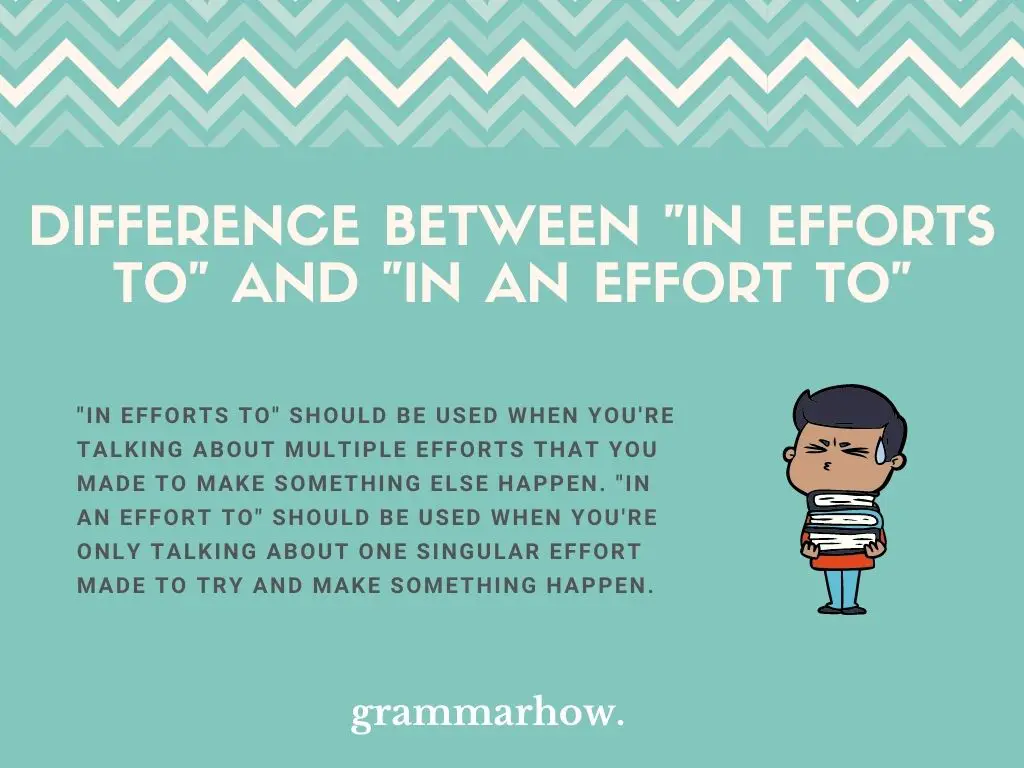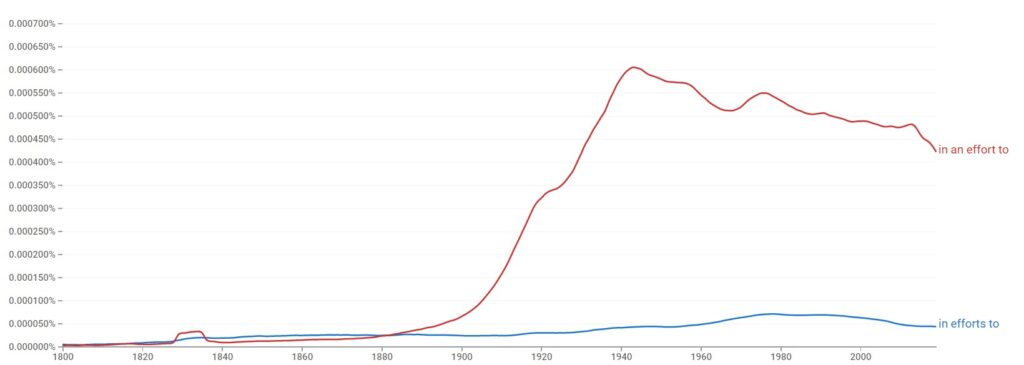The phrases “in efforts to” and “in an effort to” follow the same general ideas, but it’s important to know the differences. In this article, we’ll talk you through what those differences are and what the two phrases mean (and when to use them).
What Is The Difference Between “In Efforts To” And “In An Effort To”?
“In efforts to” should be used when you’re talking about multiple efforts that you made to make something else happen. “In an effort to” should be used when you’re only talking about one singular effort made to try and make something happen.

We use both phrases when we want to justify when we’ve done something. So, if we’ve decided that something works for us, we might try to explain why it works by saying “in an effort to” or “in efforts to.”
What Does “In Efforts To” And “In An Effort To” Mean?
Let’s go over what it means a little closer to help you understand it. Sometimes, the meaning isn’t all that obvious until you go over some specific examples.
“In efforts to” and “in an effort to” both mean that we’re justifying why we might have done something. We’re explaining what we’re expecting to happen from the thing that we’ve done.
There is no difference in meaning between the two. The only difference comes from the number of justifications you’re giving. “In an effort to” is used for one justification, while “in efforts to” is used for multiple.
Here’s what we mean:
- I changed my address in an effort to stop my ex from finding me.
- I changed my address in efforts to fix my banking problems and to prevent people from knowing where I live.
Both of these examples are correct. The first one only uses “in an effort to” because we’re only using one effort “stop my ex from finding me.”
The second example uses “in efforts to” because we’re talking about more than one problem, “fix my banking problems,” and “prevent people from knowing where I live.”
That’s how we can explain the differences in application, even though the meaning is the same.
Is “In Efforts To” Or “In An Effort To” Used The Most?
We sometimes find statistics and data to be the most useful way to learn about new language rules and phrases. That way, we can see what’s popular and what’s not.
According to Google, “in efforts to” is mentioned 4,990 times on The New York Times website, while “in an effort to” is mentioned 106,000 times.
From these results, it’s quite apparent that “in an effort to” is the most popular choice. It’s used more because we typically only use one justification when we write a sentence with it in. Also, it can be used in place of “in efforts to,” and most people prefer it for that reason as well.

If you want to go even further with the data, you can look at this graph. This graph gives us a visual example of how much more popular “in an effort to” is compared to “in efforts to.” There are just more situations where “in an effort to” makes more sense.
Can “In Efforts To” And “In An Effort To” Be Used Interchangeably?
Generally, the two phrases are not interchangeable with each other. “In efforts to” can’t be used in place of “in an effort to.” However, if we purely look at it as a one-way relationship, then we might be able to use them interchangeably.
“In an effort to” can be used interchangeably to mean “in efforts to.” That means “in an effort to” can refer to one or more justifications in a sentence. “In efforts to” cannot be used interchangeably as it can only be used to refer to multiple but never to refer to one.
Here’s what we mean by that:
- I looked her up in efforts to find out about her family and her love life.
- I looked her up in an effort to find out about her family and her love life.
We’ve already seen what “in an effort to” looks like in the singular justification. Now, we see it used interchangeably with “in efforts to.” This time, it refers to multiple justifications.
Even in this case, “in an effort to” is more popular to use. That’s most of the reason why “in efforts to” very rare sees written time in English. People just prefer the simpler form “in an effort to.”
Examples Of How To Use “In Efforts To” In A Sentence
Let’s go over some examples of using “in efforts to” in a sentence.
- I helped her out in efforts to win her heart and get her number.
- I needed more time in efforts to fix the piece that was broken and to calm myself down.
- I made a new website for my campaign in efforts to generate more traffic and get more followers.
- I work for my mother full-time in efforts to improve the family business and have a secure job for life.
As you can see, when we’re talking about more than one justification, we use “in efforts to.” That’s the only case when it will make sense. Make sure you remember this before you try to use it in the singular sense.
Examples Of How To Use “In An Effort To” In A Sentence
“In an effort to” is the more flexible phrase of the two. We can use it to refer to one or more justifications, so let’s look at a few examples.
- I learned sign language in an effort to communicate with my sister better.
- I helped him out in an effort to calm him down.
- I worked on the website in an effort to get it finished on time.
- We finished the project early in an effort to impress the boss and bring up the idea of a promotion.
We included examples that covered only one justification (in the first three). We also include two justifications in the last one so you can see how you might be able to use it in place of “in efforts to.”
“In Efforts To” And “In An Effort To” – Synonyms
Both phrases are seen as redundant and word. For the most part, there are always better alternatives you can use, especially if you’re trying to streamline your writing or keep it more formal. Use one of these synonyms to help you.
- To
It’s simple, but it’s effective. You can remove “in an effort” from the sentence entirely. “To” still conveys exactly the same meaning you’re trying to achieve.
- In order to
This is also another great synonym. It’s still considered slightly wordy, and most people still prefer “to” as the best option of the lot. Still, it works to give you options, and you don’t have to worry about the confusing rule differences between “effort” and “efforts.
You may also like: 10 Other Ways to Say “In an Effort To”
Is It Ever Correct To Use “In Effort To”?
“In effort to” is never correct to use. You’re using “effort” in the singular form without using the modifier “an” to help it. It should never be written this way.
- Correct:I changed my appearance in an effort to appeal to her.
- Incorrect:I changed my appearance in effort to appeal to her.
Is The Word Effort Countable?
When using “effort” in this phrase, it is a countable noun. That means we can apply a number to it, and that’s why we can use “an” before it. Without it being countable, the word “an” won’t work in the phrase.
Also, uncountable nouns don’t have plural forms. That means that “efforts” wouldn’t exist if they were uncountable.
What Type Of Word Is Effort?
“Effort” is a noun. We use it to talk about an attempt to do something, and it’s only ever written in the noun form.
Because it is a noun, we usually need other words to accompany it for it to make sense in a sentence. We might need a verb, like so:
- Make an effort
Or an adjective, like so:
- A great effort
Either way, “effort” is only ever a noun.
Is It Thank You For Your Effort Or Efforts?
When you want to thank somebody for the effort they put into something, it’s important to know how to do so.
You should say “thank you for your effort” when somebody has made an attempt at something on one occasion that you want to thank. You should say “thank you for your efforts” if somebody has made more than one attempt at something.
Is It Correct To “Make Efforts”?
“Make efforts” is not correct because we only use “effort” in the singular form after a verb like “make.” We have to say “make an effort” if we want to talk about an attempt that somebody has made.
There are no situations where “make efforts” will work. If you want to stay grammatically correct with your writing, then you should always make sure to include the singular countable noun “an effort.”
The only time you might here “make efforts” is in a slang format, which isn’t ideal for written English.

Martin holds a Master’s degree in Finance and International Business. He has six years of experience in professional communication with clients, executives, and colleagues. Furthermore, he has teaching experience from Aarhus University. Martin has been featured as an expert in communication and teaching on Forbes and Shopify. Read more about Martin here.
